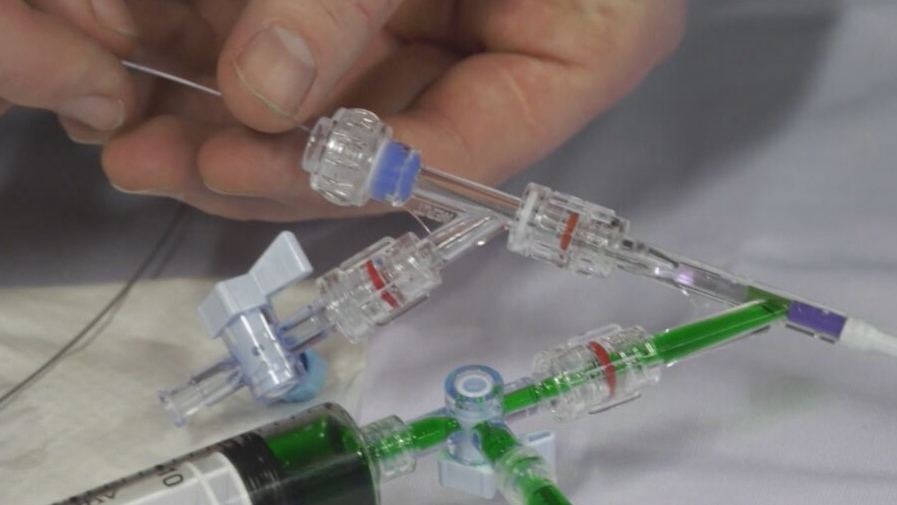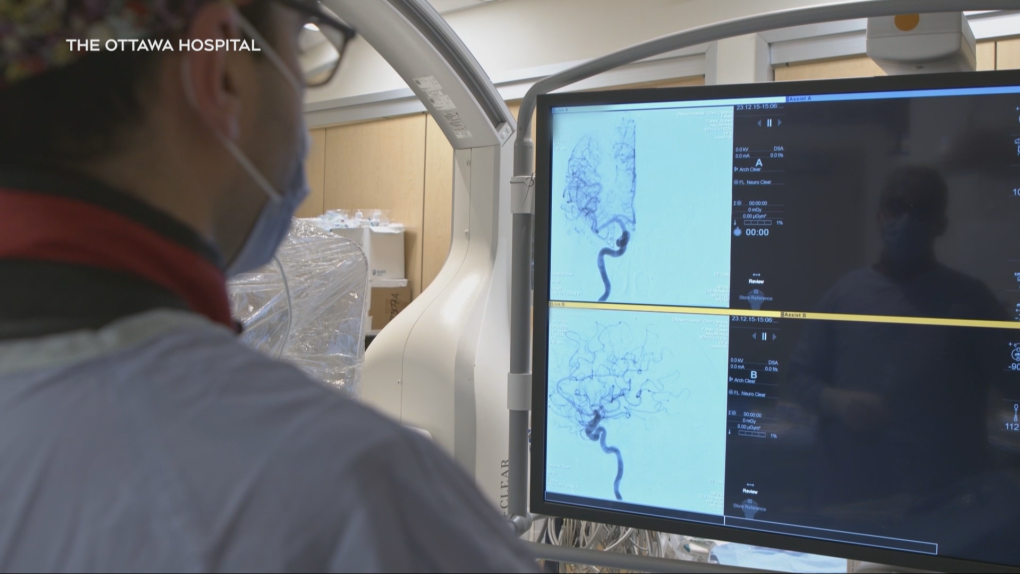UW startup achieves a world’s first with tiny camera used in brain surgery
A tiny camera was recently used in a procedure in Ottawa to help diagnose and treat a patient who suffered multiple strokes, making it a world’s first.
The device was developed by Kitchener company, Vena Medical, which started out of the University of Waterloo’s startup incubator Velocity.
The camera is barely wider than a strand of hair, which is helpful as it weaves through tight spaces in the body.
“About a third of a millimeter in diameter. So it's very, very small. The next smallest is three to four times the size of that,” said Michael Phillips, the company’s co-founder and CEO.
 Vena Medical's camera is inserted into a tube.
Vena Medical's camera is inserted into a tube.
Phillips and his other co-founder, Phil Cooper, wanted to fill an industry gap in the medical field.
Between the two of them, the duo has seven physicians in their immediate families.
They said, historically, it's been difficult to see exactly what’s going on inside veins or arteries.
“Physicians were relying on fluoroscopy, which is essentially like using a 2D X-ray movie to perform these procedures,” said Cooper.
Those limitations have existed - until now.
A medical technology milestone was recently marked at The Ottawa Hospital when physicians were able to see live video, in full colour, from inside the vessels of a patient’s brain while doing surgery. At the same time, they were able to diagnose and treat them after suffering from multiple strokes.
That had never been done before.

“If it's black and white, you can't get as much information. But for clot type, whether the clot is red or whether it's white, basically red blood cell rich or fibrin rich, that has a direct impact on which technique you should choose to treat that patient,” Phillips said.
Due to the camera’s size, the potential exists to expand its scope beyond just treating stroke patients.
“We're starting off with neurovascular procedures. So that's things like stroke, carotid artery disease, aneurysms,” Cooper said.
The cameras are disposed after one use, which is common with devices that come in contact with blood.
As for what’s next, the hope is to roll the camera out across Canada.
“There’s definitely nothing like this,” Phillips said.
CTVNews.ca Top Stories

Trudeau's 2024: Did the PM become less popular this year?
Justin Trudeau’s numbers have been relatively steady this calendar year, but they've also been at their worst, according to tracking data from CTV News pollster Nik Nanos.
Back on air: John Vennavally-Rao on reclaiming his career while living with cancer
'In February, there was a time when I thought my career as a TV reporter was over,' CTV News reporter and anchor John Vennavally-Rao writes.
The winter solstice is here, the Northern Hemisphere's darkest day
The winter solstice is Saturday, bringing the shortest day and longest night of the year to the Northern Hemisphere — ideal conditions for holiday lights and warm blankets.
Death toll in attack on Christmas market in Germany rises to 5 and more than 200 injured
Germans on Saturday mourned both the victims and their shaken sense of security after a Saudi doctor intentionally drove into a Christmas market teeming with holiday shoppers, killing at least five people, including a small child, and wounding at least 200 others.
Poilievre writes to GG calling for House recall, confidence vote after Singh declares he's ready to bring Liberals down
Conservative Leader Pierre Poilievre has written to Gov. Gen. Mary Simon, imploring her to 'use your authority to inform the prime minister that he must' recall the House of Commons so a non-confidence vote can be held. This move comes in light of NDP Leader Jagmeet Singh publishing a letter stating his caucus 'will vote to bring this government down' sometime in 2025.
Overheated immigration system needed 'discipline' infusion: minister
An 'overheated' immigration system that admitted record numbers of newcomers to the country has harmed Canada's decades-old consensus on the benefits of immigration, Immigration Minister Marc Miller said, as he reflected on the changes in his department in a year-end interview.
School custodian stages surprise for Kitchener, Ont. students ahead of holiday break
He’s no Elf on the Shelf, but maybe closer to Ward of the Board.
Kelly Clarkson's subtle yet satisfying message to anyone single this Christmas
The singer and daytime-talk show host released a fireside video to accompany her 2021 holiday album, “When Christmas Comes Around” that she dubbed, “When Christmas Comes Around…Again.
Pope Francis reprimands Vatican staff for gossiping in annual Christmas message
Pope Francis told Vatican bureaucrats on Saturday to stop speaking ill of one another, as he once again used his annual Christmas greetings to admonish the backstabbing and gossiping among his closest collaborators.


































